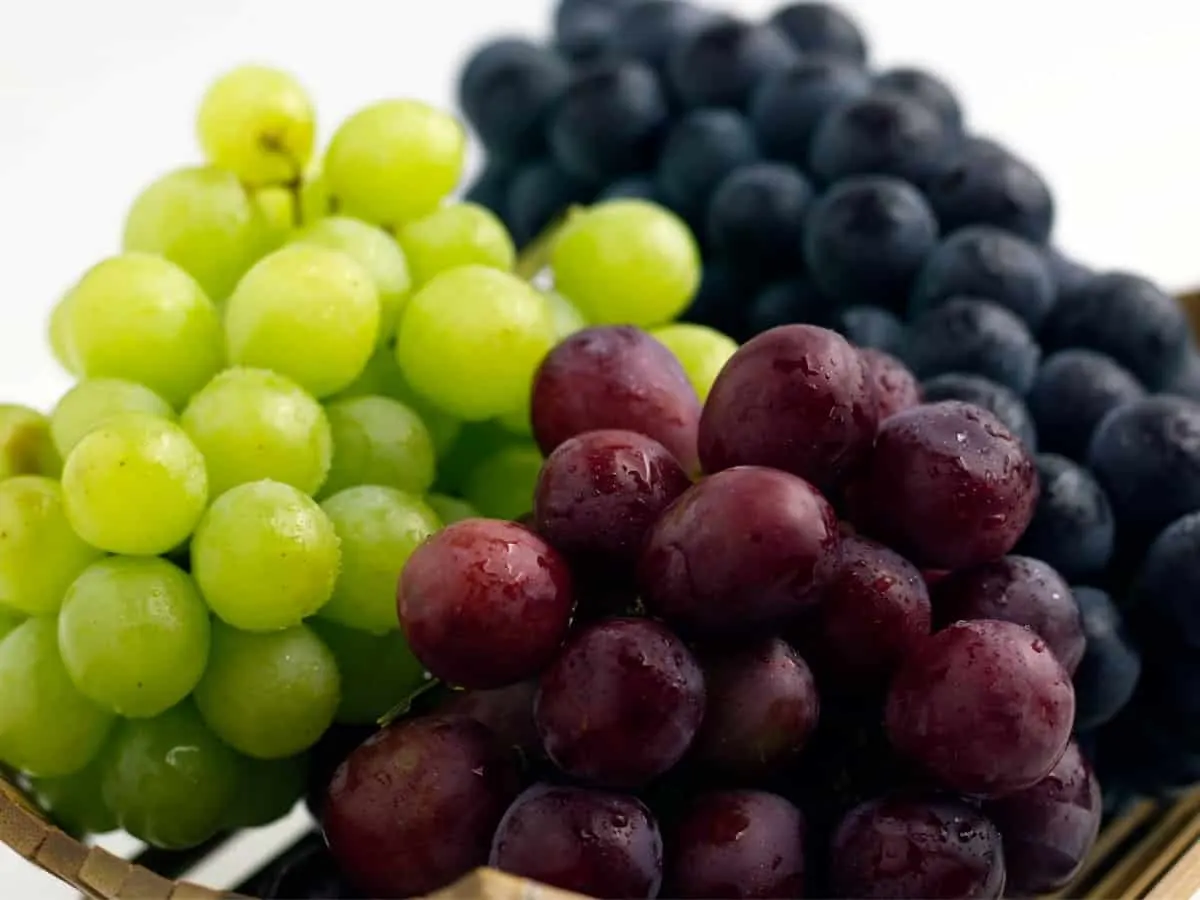Labradors are known to be curious about different types of food, especially those that are sweet in taste. Once, my rescued Labrador showed interest in the grapes I was eating and wanted to share them with me. However, you should know that not all human food is healthy or safe for Labradors. Therefore, it is essential to know whether your Labrador can eat grapes or not.
Labradors should not eat grapes as they are highly toxic to dogs. Even small amounts can cause vomiting, diarrhea, lethargy, severe kidney damage, or even kidney failure. Instead, opt for dog-friendly fruits such as apples, blueberries, and watermelon.
Feeding your Labrador the right food comes with the advantage of providing your furry friend with a happy and long life. It isn’t just about toxicity associated with grapes. There’s more to it.
This article will explain the impact of grapes on your Labrador’s body and offer safe alternatives to meet their taste buds.
Let’s get started!

Can Labradors Eat Grapes?
While grapes are a delicious and healthy snack for humans, they can be toxic and potentially deadly for dogs, including Labradors. Grapes and raisins have been linked to kidney failure in dogs, and even a small amount can cause serious health problems.
The exact substance in grapes and raisins that is toxic to dogs is still unknown, but research suggests that it affects all sizes and breeds. In a report by Canada West Veterinary Specialists, it is suspected that toxic principles such as tartaric acid, salt, and potassium bitartrate are boosting overall poisonous levels.
Symptoms of grape or raisin toxicity in your Labrador can include:
- Vomiting
- Diarrhea
- Lethargy
- Dehydration
- Abdominal pain
These symptoms may appear within just a few hours of grape consumption and, if not treated promptly, can lead to acute kidney failure.
Note that the toxic effect of grapes on dogs is unpredictable and can vary greatly. Some dogs may experience symptoms after ingesting just a few grapes, while others may show no signs after eating a larger quantity.
If your Labrador accidentally consumes grapes, prioritize early intervention by speaking to a veterinarian who may advise inducing vomiting, giving activated charcoal, or intravenous fluid therapy.
In fact, I’d also recommend using the toxicity calculator below to determine the degree of toxicity that can turn fatal for your little giant.
Be aware of the risks associated with grapes and raisins, and educate your friends and family about the potential dangers to protect your pet from accidental ingestion.

Can One Grape Kill a Labrador?
Grapes are often considered a healthy snack for humans, packed with nutrients like vitamin C, potassium, and antioxidants that contribute to overall health. When it comes to your Labrador, however, the story is quite different.
Even a single grape can be toxic for a Labrador or any other dog breed. The reason is that grapes have been found to cause severe damage to kidney tissue in dogs, but the exact substance causing this reaction is still unknown.
What’s even more puzzling is the fact that some dogs can eat grapes without any issues, while others suffer from severe toxicity after ingesting them. But that’s only an exception. You can never take chances with raisins and grapes.
According to the Merck Veterinary Manual, it takes about 6-12 hours for grapes to cause any sort of health issue to your Labrador.
“In the case of my friend’s Labrador, grapes were accidentally ingested and it took about 15+ hours to observe changes in the body including lethargy, abdominal pain, and digestive upset.”
The quantity of grapes that may affect your Labrador’s health varies and may depend on factors such as age, size, and individual sensitivity. Here’s a table illustrating the potential grape intake and corresponding life stage:
| Quantity of Grapes | Age of Labrador |
|---|---|
| 1 | All ages |
| 2-3 | Puppies |
| 2-5 | Adult |
Keep in mind that the table above is not an exact guide, as different dogs might have different levels of sensitivity to grapes.
The best practice is to avoid giving your Labrador any grapes or their dried variants to ensure their health and safety.
Here’s a helpful video that can add better insights into the effects of grapes on dogs from a vet himself. Take a look:
Symptoms of Grape Toxicity in Dogs
We’ve all made that mistake! Being unaware of what our fur baby is eating. I know I have!
Sometimes, your dog may enjoy experimenting with new foods for better flavors. In most cases, they may just be overly curious about eating it.
Things worsen when they ingest highly toxic foods like grapes!
If your Labrador accidentally eats grapes, you should watch for symptoms and signs of grape poisoning, which include:
- Nausea
- Vomiting
- Diarrhea
- Increased thirst
- Lethargy
- Excessive urination
- Weakness
- Ammonia odor
The list isn’t just limited to these signs. From my experience, I’d always go with the ideology that “prevention is always better than cure.”
Keep an eye on what your Labrador does and what happens when he ingests something!

What Should I Do If My Labrador Ate Some Grapes?
So, your Labrador has eaten grapes. What next?
As mentioned, grapes are known to be toxic to dogs and can lead to acute renal failure if not dealt with immediately.
In emergencies, we often run out of options for dealing with a specific issue. If your Labrador shows signs of toxicity, keep this checklist handy.
| What To Do | Time Since Consumption |
|---|---|
| 1. Keep calm and assess the situation | Immediately |
| 2. Call your veterinarian or pet emergency hotline | Within 30 minutes |
| 3. Induce vomiting, if advised by a professional | 30 minutes – 2 hours |
| 4. Monitor for symptoms of grape poisoning | 2 – 24 hours |
| 5. Provide supportive care based on your veterinarian’s advice | Ongoing |
In addition to the checklist, know what to give and what not to.
| Do Give | Don’t Give |
| Fresh water to help keep your dog hydrated. | Any additional food, as this may worsen the situation. |
| Any medications or treatments recommended by your veterinarian. | Over-the-counter medications or home remedies without consulting a veterinarian, as these may cause more harm than good. |
By remaining vigilant and taking swift action, you can help protect your Labrador from the potential dangers of grape poisoning.

Tips to Keep Your Labrador Safe
Here are some tips on how to prevent your dog from eating grapes.
- Keep grapes out of reach: Make sure that grapes and raisins are stored in places that are inaccessible to your Labrador. Keep them in closed cabinets or high shelves where your dog cannot reach them.
- Educate your family and guests: Make sure that everyone in your household is aware of the dangers of grapes and raisins for dogs. Educate your guests as well, especially if they have brought food or snacks that contain grapes.
- Check ingredient labels: Always check the ingredient labels of the food and treats you give to your Labrador. Avoid any product that contains grapes or raisins.
- Offer safe alternatives: Instead of grapes, offer your Labrador safe fruits such as apples, bananas, or strawberries. These fruits are not only safe for dogs but also provide essential vitamins and nutrients.
- Be vigilant: Keep an eye on your Labrador when you are outdoors, especially if there are grapevines or grape plants nearby. If you suspect that your dog has eaten grapes or raisins, seek veterinary help immediately.
What Other Foods Are Poisonous to Labradors?
Just like grapes, several other household foods are toxic to your Labrador. Here’s a list of some common ones:
- Chocolate
- Onions, chives, and garlic
- Avocado
- Alcohol
- Caffeine
- Macadamia nuts
- Xylitol (found in candies and some peanut butter)
- Unbaked bread dough
Although this list is not exhaustive, it covers some of the most common toxic foods for dogs.
In addition to avoiding the foods listed above, you should be cautious when introducing new foods to your Labrador’s diet. Some may have hidden toxic ingredients, so always do your research.
Safe Alternatives To Grapes

Incorporating healthy alternatives to grapes into your Labrador’s diet can provide various benefits, such as essential nutrients, vitamins, and minerals. Here is a list of safe and nutritious alternatives you can offer your furry friend:
- Apples (without core and seeds)
- Bananas (without feel)
- Blueberries
- Carrots
- Cucumbers
- Green beans
- Pears (without seeds)
- Pineapple
- Strawberries
- Sweet potatoes
Feel free to mix up these ingredients within your Labrador’s diet to ensure they get a healthy and diverse range of nutrients. Remember, your dog’s health and well-being depend on the choices you make for their nourishment.
FAQs
Can my Labrador eat raisins?
Raisins, like grapes, are toxic to Labradors and can cause severe health issues such as kidney failure. Don’t give anything belonging to the grape family, as it can take a toll in a few hours of ingestion.
Are both green and purple grapes harmful to Labradors?
Yes, both green and purple grapes are harmful to Labradors. Ingestion of any type or quantity of grapes can cause serious health problems such as kidney failure. Keep them out of reach and eliminate danger to your Labrador!
Can Labradors eat grape products such as grape juice or grape jelly?
Grape products such as grape juice or grape jelly can also be toxic to Labradors. The toxic compounds in grapes are present in all grape products, regardless of whether they are fresh, dried, or processed. If you want to give your dog a treat, it is safer to choose fruits that are known to be safe for dogs, such as apples, bananas, or blueberries.
Do Labradors get sick from fruit?
Some fruits, such as apples (without seeds), blueberries, and watermelon, can be healthy treats for your Labrador. However, certain fruits, like grapes, star fruit, and rhubarb leaves, are toxic to dogs and must be avoided. Don’t let your dog eat if you’re unsure of the effect or appropriateness.
Final Thoughts
Labradors have their own restrictions when it comes to food. Grapes and raisins are termed highly toxic foods that can affect the canine digestive system and metabolism in no time. When you raise a Labrador, start with proper research about safe and unsafe foods.
Build a cool meal plan every week, and it will ease your parenting. Above all, it lets you avoid potential dangers without any big effort.
Related Posts You May Like:


